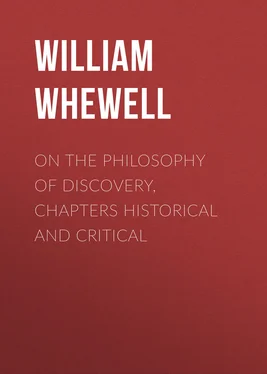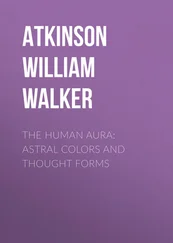William Whewell - On the Philosophy of Discovery, Chapters Historical and Critical
Здесь есть возможность читать онлайн «William Whewell - On the Philosophy of Discovery, Chapters Historical and Critical» — ознакомительный отрывок электронной книги совершенно бесплатно, а после прочтения отрывка купить полную версию. В некоторых случаях можно слушать аудио, скачать через торрент в формате fb2 и присутствует краткое содержание. Жанр: foreign_prose, foreign_religion, Философия, foreign_psychology, foreign_antique, на английском языке. Описание произведения, (предисловие) а так же отзывы посетителей доступны на портале библиотеки ЛибКат.
- Название:On the Philosophy of Discovery, Chapters Historical and Critical
- Автор:
- Жанр:
- Год:неизвестен
- ISBN:нет данных
- Рейтинг книги:5 / 5. Голосов: 1
-
Избранное:Добавить в избранное
- Отзывы:
-
Ваша оценка:
- 100
- 1
- 2
- 3
- 4
- 5
On the Philosophy of Discovery, Chapters Historical and Critical: краткое содержание, описание и аннотация
Предлагаем к чтению аннотацию, описание, краткое содержание или предисловие (зависит от того, что написал сам автор книги «On the Philosophy of Discovery, Chapters Historical and Critical»). Если вы не нашли необходимую информацию о книге — напишите в комментариях, мы постараемся отыскать её.
On the Philosophy of Discovery, Chapters Historical and Critical — читать онлайн ознакомительный отрывок
Ниже представлен текст книги, разбитый по страницам. Система сохранения места последней прочитанной страницы, позволяет с удобством читать онлайн бесплатно книгу «On the Philosophy of Discovery, Chapters Historical and Critical», без необходимости каждый раз заново искать на чём Вы остановились. Поставьте закладку, и сможете в любой момент перейти на страницу, на которой закончили чтение.
Интервал:
Закладка:
Since this work is thus so important in the history of Inductive Philosophy I shall give, in a note, a view 63 63 Contents of Roger Bacon's Opus Majus . Part I. On the four causes of human ignorance:—Authority, Custom, Popular Opinion, and the Pride of supposed Knowledge. Part II. On the source of perfect wisdom in the Sacred Scripture. Part III. On the Usefulness of Grammar. Part IV. On the Usefulness of Mathematics. (1) The necessity of Mathematics in Human Things (published separately as the Specula Mathematica ). (2) The necessity of Mathematics in Divine Things.—1 o . This study has occupied holy men: 2 o . Geography: 3 o . Chronology: 4 o . Cycles; the Golden Number, &c.: 5 o . Natural Phenomena, as the Rainbow: 6 o . Arithmetic: 7 o . Music. (3) The necessity of Mathematics in Ecclesiastical Things. 1 o . The Certification of Faith: 2 o . The Correction of the Calendar. (4) The necessity of Mathematics in the State.—1 o . Of Climates: 2 o . Hydrography: 3 o . Geography: 4 o . Astrology. Part V. On Perspective (published separately as Perspectiva ). (1) The organs of vision. (2) Vision in straight lines. (3) Vision reflected and refracted. (4) De multiplicatione specierum (on the propagation of the impressions of light, heat, &c.) Part VI. On Experimental Science.
of its divisions and contents. But I must now endeavour to point out more especially the way in which the various principles, which the reform of scientific method involved, are here brought into view.
One of the first points to be noticed for this purpose, is the resistance to authority; and at the stage of philosophical history with which we here have to do, this means resistance to the authority of Aristotle, as adopted and interpreted by the Doctors of the Schools. Bacon's work 64 64 Op. Maj. p. 1.
is divided into Six Parts; and of these Parts, the First is, Of the four universal Causes of all Human Ignorance. The causes thus enumerated 65 65 Ibid. p. 2.
are:—the force of unworthy authority;—traditionary habit;—the imperfection of the undisciplined senses;—and the disposition to conceal our ignorance and to make an ostentatious show of our knowledge. These influences involve every man, occupy every condition. They prevent our obtaining the most useful and large and fair doctrines of wisdom, the secret of all sciences and arts. He then proceeds to argue, from the testimony of philosophers themselves, that the authority of antiquity, and especially of Aristotle, is not infallible. "We find 66 66 Ibid. p. 10.
their books full of doubts, obscurities, and perplexities. They scarce agree with each other in one empty question or one worthless sophism, or one operation of science, as one man agrees with another in the practical operations of medicine, surgery, and the like arts of Secular men. Indeed," he adds, "not only the philosophers, but the saints have fallen into errors which they have afterwards retracted," and this he instances in Augustin, Jerome, and others. He gives an admirable sketch 67 67 I will give a specimen. Opus Majus , c. viii. p. 35: "These two kinds of philosophers, the Ionic and Italic, ramified through many sects and various successors, till they came to the doctrine of Aristotle, who corrected and changed the propositions of all his predecessors, and attempted to perfect philosophy. In the [Italic] succession, Pythagoras, Archytas Tarentinus and Timæus are most prominently mentioned. But the principal philosophers, as Socrates, Plato, and Aristotle, did not descend from this line, but were Ionics and true Greeks, of whom the first was Thales Milesius.... Socrates, according to Augustine in his 8th book, is related to have been a disciple of Archelaus. This Socrates is called the father of the great philosophers, since he was the master of Plato and Aristotle, from whom all the sects of philosophers descended.... Plato, first learning what Socrates and Greece could teach, made a laborious voyage to Egypt, to Archytas of Tarentum and Timæus, as says Jerome to Paulinus. And this Plato is, according to holy men, preferred to all philosophers, because he has written many excellent things concerning God, and morality, and a future life, which agree with the divine wisdom of God. And Aristotle was born before the death of Socrates, since he was his hearer for three years, as we read in the life of Aristotle.... This Aristotle, being made the master of Alexander the Great, sent two thousand men into all regions of the earth, to search out the nature of things, as Pliny relates in the 8th book of his Naturalia , and composed a thousand books, as we read in his life."
of the progress of philosophy from the Ionic School to Aristotle; of whom he speaks with great applause. "Yet," he adds 68 68 Ibid. p. 36.
, "those who came after him corrected him in some things, and added many things to his works, and shall go on adding to the end of the world." Aristotle, he adds, is now called peculiarly 69 69 Autonomaticè.
the Philosopher, "yet there was a time when his philosophy was silent and unregarded, either on account of the rarity of copies of his works, or their difficulty, or from envy; till after the time of Mahomet, when Avicenna and Averroes, and others, recalled this philosophy into the full light of exposition. And although the Logic and some other works were translated by Boethius from the Greek, yet the philosophy of Aristotle first received a quick increase among the Latins at the time of Michael Scot; who, in the year of our Lord 1230, appeared, bringing with him portions of the books of Aristotle on Natural Philosophy and Mathematics. And yet a small part only of the works of this author is translated, and a still smaller part is in the hands of common students." He adds further 70 70 Op. Maj. p. 46.
(in the Third Part of the Opus Majus , which is a Dissertation on language), that the translations which are current of these writings, are very bad and imperfect. With these views, he is moved to express himself somewhat impatiently 71 71 See Pref. to Jebb's edition. The passages, there quoted, however, are not extracts from the Opus Majus , but (apparently) from the Opus Minus ( MS. Cott. Tib. c. 5.) "Si haberem potestatem supra libros Aristotelis, ego facerem omnes cremari; quia non est nisi temporis amissio studere in illis, et causa erroris, et multiplicatio ignorantiæ ultra id quod valeat explicari.... Vulgus studentum cum capitibus suis non habet unde excitetur ad aliquid dignum, et ideo languet et asininat circa male translata, et tempus et studium amittit in omnibus et expensas."
respecting these works: "If I had," he says, "power over the works of Aristotle, I would have them all burnt; for it is only a loss of time to study in them, and a cause of error, and a multiplication of ignorance beyond expression." "The common herd of students," he says, "with their heads, have no principle by which they can be excited to any worthy employment; and hence they mope and make asses of themselves over their bad translations, and lose their time, and trouble, and money."
The remedies which he recommends for these evils, are, in the first place, the study of that only perfect wisdom which is to be found in the sacred Scripture 72 72 Part ii.
, in the next place, the study of mathematics and the use of experiment 73 73 Parts iv. v. and vi.
. By the aid of these methods, Bacon anticipates the most splendid progress for human knowledge. He takes up the strain of hope and confidence which we have noticed as so peculiar in the Roman writers; and quotes some of the passages of Seneca which we adduced in illustration of this:—that the attempts in science were at first rude and imperfect, and were afterwards improved;—that the day will come, when what is still unknown shall be brought to light by the progress of time and the labours of a longer period;—that one age does not suffice for inquiries so wide and various;—that the people of future times shall know many things unknown to us;—and that the time shall arrive when posterity will wonder that we overlooked what was so obvious. Bacon himself adds anticipations more peculiarly in the spirit of his own time. "We have seen," he says, at the end of the work, "how Aristotle, by the ways which wisdom teaches, could give to Alexander the empire of the world. And this the Church ought to take into consideration against the infidels and rebels, that there may be a sparing of Christian blood, and especially on account of the troubles that shall come to pass in the days of Antichrist; which by the grace of God, it would be easy to obviate, if prelates and princes would encourage study, and join in searching out the secrets of nature and art."
Интервал:
Закладка:
Похожие книги на «On the Philosophy of Discovery, Chapters Historical and Critical»
Представляем Вашему вниманию похожие книги на «On the Philosophy of Discovery, Chapters Historical and Critical» списком для выбора. Мы отобрали схожую по названию и смыслу литературу в надежде предоставить читателям больше вариантов отыскать новые, интересные, ещё непрочитанные произведения.
Обсуждение, отзывы о книге «On the Philosophy of Discovery, Chapters Historical and Critical» и просто собственные мнения читателей. Оставьте ваши комментарии, напишите, что Вы думаете о произведении, его смысле или главных героях. Укажите что конкретно понравилось, а что нет, и почему Вы так считаете.












